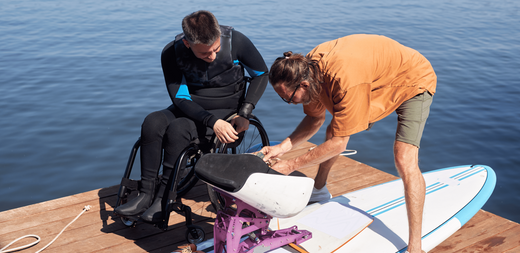Aquatic sports for the disabled, celebrated after the Paris 2024 Paralympic Games, continue to open up horizons for people with disabilities. Through sports such as adapted swimming, water polo, canoeing, surfing and diving, athletes experience unrivalled freedom in the water. These activities promote mobility, independence and well-being, while improving self-confidence. Initiatives like Handiplage (beach for disabled) and adapted equipment, such as the Floatee drowning-proof T-shirt, make access and safety even easier, allowing everyone to enjoy the pleasures of the water with complete peace of mind.
The Paris 2024 Paralympic Games officially ended on 8 September 2024. It was a real popular success, and now it's essential that sport for the disabled continues to shine through in our everyday lives! Today, we invite you to take a closer look at aquatic sports for the disabled.
Much more than just a sport, aquatic sports for the disabled open doors to exceptional freedom, self-transcendence and inclusion. According to the French Federation of Sports for the Disabled, out of the 18 million sports members in France, 35,000 are involved in sports for the disabled. For decades, disabled athletes have been pushing back the boundaries of what is possible in sport, and aquatics stands out as one of the most accessible and transformative disciplines.
Aquatic sports for the disabled: a world of freedom
Water sports offer a unique sense of freedom and equality. Water, a natural element that envelops and supports the body, allows us to move without the constraints of earthly gravity. For many people with disabilities, it's a place where physical limits are erased, where you can rediscover yourself, surpass yourself and enjoy new experiences. Whether in a swimming pool, the sea or a river, adapted water sports offer physical well-being, escape and inclusion.

The various adapted water sports
The world of water sports for the disabled is vast and diverse. Here is an overview of the most popular disciplines:
1. Adapted swimming
Swimming is one of the most popular sports for people with disabilities. It helps to build endurance, muscular strength and coordination, while reducing stress on the joints. Paralympic swimming competitions are divided into specific categories according to the different types of disability (physical, visual, intellectual), giving each swimmer the opportunity to shine and push back their limits.

2. Water polo for the disabled
Adapted water polo is a demanding discipline that combines teamwork, agility and endurance. The rules are adjusted to allow fair participation while maintaining the intensity and dynamics of the game. This team sport offers a fun and competitive experience, while building self-confidence and team spirit.
3. Adapted canoeing
For nature lovers, canoeing or kayaking is an excellent way to enjoy the outdoors while getting some exercise. Boats are often modified to suit the needs of athletes, with additional supports or propulsion aids. Whether on a calm river or in the sea, canoeing offers thrills and total immersion in the natural environment.

4. Adapted surfing
Surfing, a symbol of freedom, is also accessible to people with disabilities. With adapted boards and specialised instructors, sports enthusiasts can experience the intense joy of riding the waves. Adapted surfing is not just a sport, it's a deep connection with nature and a personal challenge that helps to develop balance, concentration and self-confidence.
5. Adapted scuba diving
Scuba diving is a unique experience, opening up a fascinating underwater world. There are specialised diving programmes for people with disabilities, offering personalised support, adapted equipment and rigorous safety protocols. Whether you want to explore coral reefs or simply discover the sensation of weightlessness underwater, scuba diving offers complete immersion in a new world.
The benefits of water sports for people with disabilities
As well as being a fantastic playground, water offers considerable physical and mental benefits. Physically, water sports help to strengthen muscles without traumatising joints. Water, with its ability to carry the body, relieves tension, while offering a natural resistance that helps improve strength and endurance. On a mental level, aquatic activities bring a sense of well-being, reduce stress and promote relaxation.
For people with disabilities, water often becomes a space of freedom where limitations are lessened. In the water, they can move more easily, free themselves from physical constraints and feel an autonomy that is often difficult to achieve on land. These sports also help to develop self-confidence, improve self-esteem and encourage social interaction, whether in a competitive or recreational context.
Handiplage, the beach for the disabled: accessibility on the rise
Thanks to initiatives such as Handiplage, beaches are becoming increasingly accessible to people with disabilities. These equipped beaches make access to the sea easier, with specific equipment such as amphibious wheelchairs, access ramps and adapted showers.
These facilities enable people with reduced mobility to enjoy swimming and the pleasures of the beach in complete safety. Handiplage is a real vehicle for inclusion, offering everyone the chance to discover the benefits of the sea.
Towards an even more inclusive future
Adapted technologies and equipment are constantly evolving, making water sports increasingly accessible. Whether through personalised flotation devices, adaptive wetsuits or tailor-made training techniques, access to these activities is widening to include a greater number of people with disabilities. These developments not only make sport possible, they also make it safer and more comfortable.
Floatee: a revolution in water safety, a tool for the disabled
In this spirit of innovation and safety, Floatee stands out as a revolutionary tool. This anti-drowning T-shirt has been designed to provide safety to prevent the risks of drowning. In 2024 in France, 52% of drowning cases affected adults. With this in mind, Floatee has come up with an anti-drowning T-shirt designed not only for children, but also for people with disabilities. This product is adaptable and offers increased safety during water activities, guaranteeing optimum protection for everyone, whatever their physical condition.
Floatee comes in two versions:
- an automatic version which is activated if you accidentally fall into the water. This version can be particularly useful for people with limited mobility, especially in the hands, or for those who want to enjoy the water's edge with complete peace of mind.
- The manual version can be activated by pulling a tab. Whether you're a canoeist, a swimmer or just want to relax by the sea, Floatee is there to keep you safe while giving you the freedom to enjoy the water to the full.
With Floatee, safety no longer compromises fun, and everyone can explore the aquatic world with confidence.
Adapted water sports open up a vast range of possibilities for people with disabilities, with a variety of accessible disciplines that encourage connection with the water, personal development and challenging oneself.
Each activity, whether swimming, diving, surfing or kayaking, offers a space of freedom where physical limitations are erased in favour of well-being and autonomy. Safety remains essential, with dedicated beaches to guarantee access to the water for the disabled, and equipment such as the Floatee anti-drowning T-shirt to ensure optimum protection during aquatic activities or in close proximity to the water.
Sources (in French):




